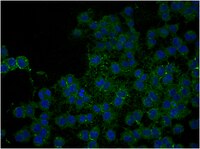Myelin repair in vivo is increased by targeting oligodendrocyte precursor cells with nanoparticles encapsulating leukaemia inhibitory factor (LIF).
Rittchen, S; Boyd, A; Burns, A; Park, J; Fahmy, TM; Metcalfe, S; Williams, A
Biomaterials
56
78-85
2015
Abstract anzeigen
Multiple sclerosis (MS) is a progressive demyelinating disease of the central nervous system (CNS). Many nerve axons are insulated by a myelin sheath and their demyelination not only prevents saltatory electrical signal conduction along the axons but also removes their metabolic support leading to irreversible neurodegeneration, which currently is untreatable. There is much interest in potential therapeutics that promote remyelination and here we explore use of leukaemia inhibitory factor (LIF), a cytokine known to play a key regulatory role in self-tolerant immunity and recently identified as a pro-myelination factor. In this study, we tested a nanoparticle-based strategy for targeted delivery of LIF to oligodendrocyte precursor cells (OPC) to promote their differentiation into mature oligodendrocytes able to repair myelin. Poly(lactic-co-glycolic acid)-based nanoparticles of ∼120 nm diameter were constructed with LIF as cargo (LIF-NP) with surface antibodies against NG-2 chondroitin sulfate proteoglycan, expressed on OPC. In vitro, NG2-targeted LIF-NP bound to OPCs, activated pSTAT-3 signalling and induced OPC differentiation into mature oligodendrocytes. In vivo, using a model of focal CNS demyelination, we show that NG2-targeted LIF-NP increased myelin repair, both at the level of increased number of myelinated axons, and increased thickness of myelin per axon. Potency was high: a single NP dose delivering picomolar quantities of LIF is sufficient to increase remyelination. Impact statement Nanotherapy-based delivery of leukaemia inhibitory factor (LIF) directly to OPCs proved to be highly potent in promoting myelin repair in vivo: this delivery strategy introduces a novel approach to delivering drugs or biologics targeted to myelin repair in diseases such as MS. | | 25934281
 |
BMP signaling in astrocytes downregulates EGFR to modulate survival and maturation.
Scholze, AR; Foo, LC; Mulinyawe, S; Barres, BA
PloS one
9
e110668
2014
Abstract anzeigen
Astrocytes constitute a major cell population in the brain with a myriad of essential functions, yet we know remarkably little about the signaling pathways and mechanisms that direct astrocyte maturation. To explore the signals regulating astrocyte development, we prospectively purified and cultured immature postnatal rodent astrocytes. We identified fibroblast growth factors (FGFs) and bone morphogenetic proteins (BMPs) as robust trophic factors for immature astrocytes. We showed that astrocytes respond directly to BMPs via phosphorylation of the smad1/5/8 pathway. In vitro, BMP signaling promoted immature astrocytes to adopt multiple characteristics of mature astrocytes, including a more process-bearing morphology, aquaporin-4 (AQP4) and S100β immunoreactivity, limited proliferation, and strong downregulation of epidermal growth factor receptor (EGFR). In vivo, activation of the smad1/5/8 pathway in astrocytes was seen during early postnatal development, but inhibition of astrocyte proliferation was not observed. These insights can aid in the further dissection of the mechanisms and pathways controlling astrocyte biology and development. | Immunofluorescence | 25330173
 |












